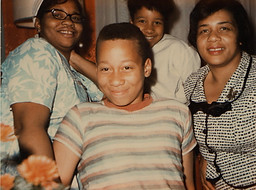
Natalie Manns
-AUTHOR-FILMMAKER-VOCALIST-



Why Such a Personal Story ?
This book began as a journal I kept during my mother's hospitalization. I wanted to keep track of who the doctors were, what they were giving her, and what procedures they were performing on her. As it turns out, it became a therapeutic tool that helped keep me sane during one of the most insane times of my life. I wanted to be able to document everything that happened to her...but it turned into a story of everything that happened to us.
After the first draft was completed, I thought, "Nat, are you nuts to open up like this to the public?!?" I believe that's why it took me over seven years to complete it! But as I toiled along, chipping away through the tougher chapters, I realized what I was ultimately writing about was too important to not share. Do I feel exposed? Yes, of course. Was it necessary? Yes...of course!
As a woman in her 50's, I wrote this story to appeal to adults aged 40-55 who were born to the 76 million “baby-boomers” - those born between 1946 and 1964 (1). Of those, African-Americans make up 9.8 percent of the “boomer” population (2). By 2050, African Americans age 65 and older will show a three-fold increase in the population. They will be accompanied by increases in chronic health conditions like diabetes, hypertension, cardiovascular disease and cancer, mental health disorders like depression, and cognitive impairments such as dementia and Alzheimer’s disease (3). We, the adult children of these baby-boomers, will be responsible for providing care to them. We need to be prepared for such an overwhelming task. These adults are new to the challenge of caring for their parents and, for the most part, have no skills on how to deal with them.
My goal was to create a useful guide to these adult children to dramatically show the need for early detection screening, to teach them to speak up and be an advocate for their parents, and to validate their own feelings, fears, and frustration’s. I also wanted to teach non-destructive coping methods that will avoid the battles I encountered with family, friends, and the medical profession. Their parents can also learn about being proactive with their healthcare and show the consequences of waiting too long to get medical attention.
There are few books of this nature, from the African-American point of view, that delve into the “unspoken” issues around health screenings and treatment. Many cultures, particularly the African-American culture, traditionally do not subscribe to preventative screenings and oftentimes only see a doctor when it’s too late. And even then, the majority either don’t question their doctors and accept what they say; or worse, they ignore the doctor and pretend nothing is wrong. My book will look at this aspect from one African-American’s point of view, although the story rings true across many cultures.
In 2009 as many as 29% of the U.S. adult population, or 65.7 million people, were caring for adults, the elderly, and children with special needs (4). Many adult children are finding the need to take on this responsibility, many times in their own homes, without being equipped with information on what to expect. The struggle of parents trying to hold on to any control becomes a challenge as well, when both parent and child struggle to maintain their independence. These Adult children, and even their grandchildren, will find this book useful as they are charged with caring for an older adult - be it their spouse, loved one, parent, or grandparent.
So do yourself a favor, take care of yourself...get screened and be an advocate!
FOOTNOTES:
(1) Aging in America-Baby Boomers, Arianna Huffington, Huffington Post, April 2, 2012
(2) Oldest Baby Boomer Turns 60, US Census Bureau, Facts for Features – Special Edition, January 3, 2006
(3) Changing Hues and the Baby Boom, Dr. Karen D. Lincoln, Ph.D., M.S.W., M.A., Healthy Black America, May 13, 2012
(4) Caregiving In the US 2009, Nancy Thompson (AARP) and Ted Mitchell (MetLIFE), National Alliance for Caregiving 2009
The Need For Health Screenings
...and for being an advocate!
